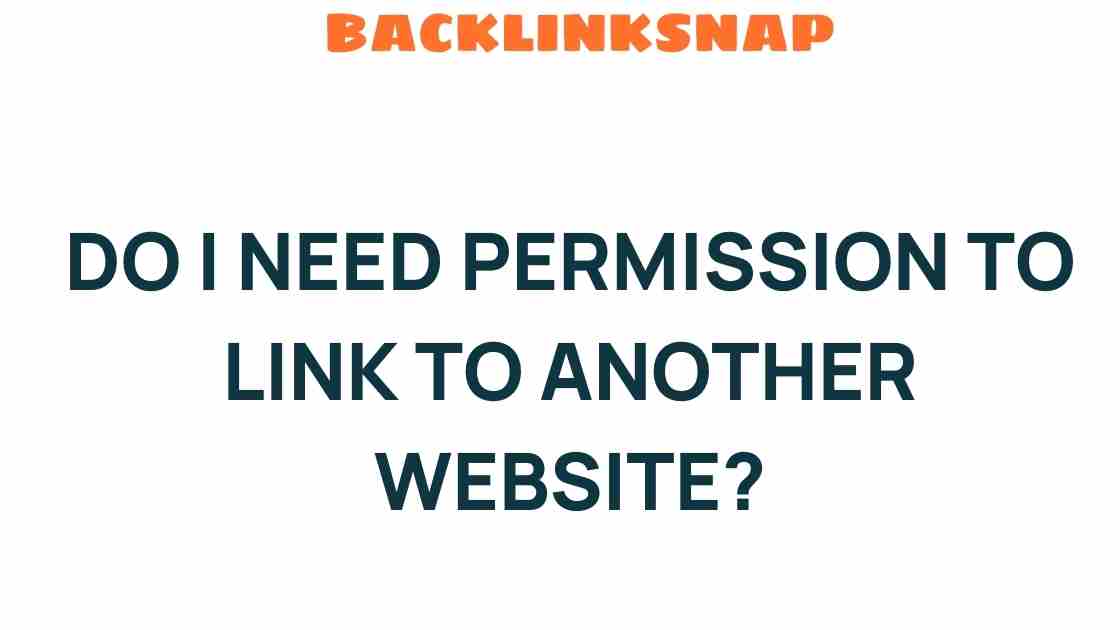Do I Need Permission to Link to Another Website? Unravel the Mystery
Linking to other websites is a common practice in the digital landscape, but it raises questions about linking policies, copyright, and web etiquette. As we navigate this complex online environment, it’s essential to understand the legal considerations and best practices involved in creating backlinks. So, do you really need permission to link to another website? Let’s delve into this intriguing topic.
Understanding Linking Policies
Linking policies vary significantly from one website to another. Some sites are open to links, encouraging users to share their content, while others may have restrictions or specific guidelines. Generally, the act of linking is considered a fundamental aspect of the internet, enabling users to navigate seamlessly from one piece of content to another. However, it’s crucial to be aware of the nuances involved.
When creating a link, there are two main types you might encounter:
- DoFollow Links: These links allow search engines to follow them and contribute to the linked site’s SEO ranking.
- NoFollow Links: These links instruct search engines not to follow them, which means they don’t pass on SEO benefits.
While most websites do not require explicit permission to link to their content, it’s essential to consider the context and nature of the link. For example, if you’re quoting or referring to specific content, proper attribution is vital. This practice not only respects the original creator’s rights but also enhances your credibility as a content creator.
Copyright and Digital Rights
Copyright plays a significant role in determining whether you need permission to link to another website. In general, merely linking to a webpage is not considered copyright infringement. However, if you reproduce content from that site—like images, text, or videos—you’re stepping into copyright territory.
To avoid any legal troubles, remember these key points:
- Linking to a website is typically permissible under the principle of fair use.
- Always provide proper attribution when using someone else’s content.
- Check the website’s terms of service for specific linking policies.
In some cases, websites may have explicit “linking policies” that outline how they prefer others to link to their content. These policies can include whether to use nofollow tags, whether deep linking is allowed, or if specific content can be linked at all.
Web Etiquette: Linking Responsibly
Web etiquette is an often-overlooked aspect of linking. While you may be legally allowed to link to another website, it’s courteous to consider how your links impact the user experience. Here are a few tips for linking responsibly:
- Use Descriptive Anchor Text: Make sure your anchor text clearly describes the linked content, helping users understand what they’ll find.
- Avoid Overlinking: Too many links can detract from your content and overwhelm readers.
- Check for Broken Links: Regularly audit your links to ensure they lead to live content.
By adhering to these principles, you not only respect the rights of content creators but also enhance your own site’s user experience, thereby fostering trust and engagement.
The SEO Angle: Backlinks Matter
From an SEO perspective, backlinks are crucial. High-quality backlinks can significantly improve your website’s authority and ranking on search engines. When you link to reputable sites, it signals to search engines that your content is valuable and trustworthy. Here’s how to make the most of backlinks:
- Focus on Relevance: Link to sites that are relevant to your content and audience.
- Build Relationships: Engage with other content creators and websites to foster a mutual linking environment.
- Monitor Your Backlinks: Use tools like Google Search Console to track the performance of your backlinks.
Moreover, the practice of linking to authoritative sources enriches your content and provides your readers with additional resources, enhancing the overall value of your site.
Legal Considerations: When to Seek Permission
While linking is generally accepted, there are instances where seeking permission is advisable. If your link involves:
- Embedding copyrighted media (like images or videos)
- Using a trademarked logo or brand name
- Linking to sensitive or proprietary content
In these cases, contacting the website owner for permission is not just a good practice; it’s often legally required. This helps you avoid potential copyright claims and ensures that you’re respecting the creator’s digital rights.
FAQs About Linking to Other Websites
- Do I need permission to link to another blog?
No, generally you don’t need permission, but always check the site’s linking policies. - What if I link to a site that has incorrect information?
While you can link to any site, consider the credibility of the source as it reflects on you. - Can I use an image from another website if I link to it?
No, you should avoid using images without permission, even if you link to them. - What are the consequences of not following linking etiquette?
It could damage your reputation and affect user trust. - How do backlinks affect SEO?
Backlinks from reputable sites improve your search engine ranking and authority. - Should I use nofollow links for all external links?
No, use nofollow links selectively, especially for sponsored or unverified content.
Conclusion
In the vast world of the internet, linking is an essential practice, but it comes with responsibilities. Understanding linking policies, copyright laws, and web etiquette will not only help you navigate the legal landscape of online content but also foster a respectful and trustworthy digital community. Always remember that while linking is generally allowed, being considerate and informed about the implications of your links is the best approach. So go ahead—link wisely, and let your content shine in the digital realm!
For more insights on digital rights and online content, check out this comprehensive guide.
Additionally, if you’re looking for more tips on SEO and backlinks, visit this helpful resource.
This article is in the category Backlink and created by BacklinkSnap Team




